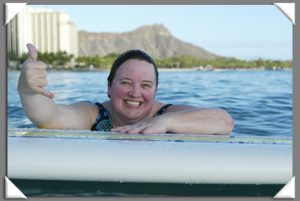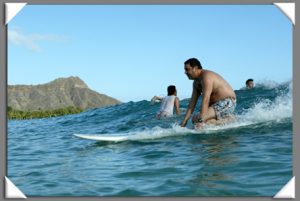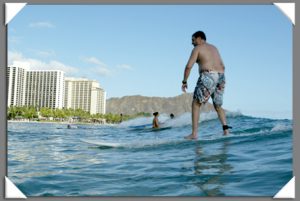VOICE2010, the international conference for voiceover talent held in Los Angeles, has ended, and the participants have gone home. I appreciated reading blog updates from other voice talent all the more since I wasn’t there. My travel budget this spring was spent instead on a trip with Drew to Hawaii. However, I was reminded of 7 great lessons that apply to a voice-over career, all courtesy of my surfing instructor.
SURFING? As in the water sport known for “hanging 10”? If you’re wondering what my surfing instructor could possibly teach about voiceover, read on!


Drew and I went to Honolulu to celebrate his birthday. We make it a point to travel each year for one of our birthdays, and it was his turn to pick the destination this year. He picked Hawaii so he could later say that he had a surfing lesson on Waikiki Beach on his birthday. 🙂
Drew found our instructor Erik Lillmars at DCX Surfing School by doing a Google search for surfing lessons on Oahu. Since Drew is also a photographer, he liked the fact that Erik’s site included photography services. In fact, Drew selected this particular instructor because photography was listed.
Two things are important from this part of the story:
1. Get your own web site, preferably with your own domain. Also, make sure that search engines can you based on your geographic area. People often prefer to deal with someone locally. While it’s a global economy, I want to be the voice actor of choice for anyone in the Atlanta area!
2. If you offer extra services outside of voice-over (copywriting, audio editing, marketing consultation, etc.) or have some specialized subject knowledge, be sure to include that information on your site. Lots of people are voice talent. Your value-added services or subject expertise may be the reason you are hired.
Erik taught the lesson in his office on Koa Avenue, a block off of Waikiki Beach. He talked to us a long time before ever getting to the actual mechanics of the lesson. Some of his topics centered around Zen and meditation; he indicated the best surfers practice meditation to quiet their minds and visualize their success.
Erik also repeatedly told us to relax. If you’re aren’t relaxed on a surfboard, you’ll be unsteady on the board and could fall off the side before you ever get to a wave. (Trust me on this one.) If you actually get to the point of being ready to ride a wave, tension in your body could cause you to lose your balance and injure yourself in falling off the surfboard.
3. Relax. If you aren’t relaxed in front of a microphone, your throat muscles will constrict, and the tension will be heard in your voice and on the recording. What’s worse, people can hear that tension and will want to shy away from your work. You may not think you could get injured doing voiceover work, but the long-term effects of strained vocal cords can lead to damage.
Most surfing instructors probably show you something about standing up on the surfboard using the actual board while on the beach. In our lesson, though, Erik spread a mat on the floor of his office and showed us the moves there.
The surfers you’ve seen on TV make it look so easy; they get to a standing position as if by magic. (If you want the magic formula to make your voiceover work look easy, skip ahead to lesson number 6.) Erik stressed safety and showed us how to get to our knees, put one foot in front of you, and finally rise to a standing position while turning to a sideways stance for balance. He had us practice this move several times in the office. Erik showed us how to dip down while twisting our body to maintain balance.


4) Stand up in stages. Just because you have done something briefly in a class setting doesn’t necessarily make you ready and qualified to perform the actual work. I especially worry about those aspiring voice talent who take a 2-hour group class and then jump into making a demo. It’s akin to the same level of preparation and expertise you have after practicing a move 3 times on a floor mat and then thinking you can surf in deep water.
Drew and I had to carry a 9-foot surfboards under each of our arms when walking from the office to the beach, which was maybe a fifth of a mile. After toting that load in the Hawaii heat, I was TIRED by the time we got to the spot on the beach!
Once we finally got in the water and on our surfboards, I felt very shaky on the hard, wood surfboard. As I started paddling out to the waves, my neck hurt immensely, and I kept feeling like I would fall off the board. Erik encouraged me to get off the board and float in the water rather than risking injury. I told Erik that it was more important for him to spend his time with Drew, and I would be happy just hanging out in the water for the duration of the lesson.
During the office part of the lesson, our instructor also told us that he had studied the pattern of the waves. Using a traffic analogy, he said that the incoming and outgoing surfers should be in separate lanes. We were impressed that Erik had created a chart that showed us how to use a particular balcony of a hotel and a structure near Diamond Head as a visual guide to our proper lane.
Like the sun over the Hawaiian beach, Erik’s research was golden. Waikiki Beach is the world’s most famous beach and probably has the greatest concentration of surfers at any given moment. Since Erik had spent hours and hours in studying the patterns and rhythms of the ocean, he knew the best position in the water to catch the wave. He also knew the best place to be if you wanted to hang out in the outgoing surfing “lane” while staying safely out of the way of dozens of incoming surfers. I greatly appreciated that insight since that’s where I was while Eric was working with Drew.


As Drew was riding a wave toward the beach, Erik came back to me. He commented several times about inexperienced surfers who were going out to a spot where no one else was. He said the waves didn’t break in those locations, so the stray surfers were wasting their time.
5) Know where the waves are. Once you have decided to pursue a voice-over career, you need to analyze your strengths and gifts to know where your voice fits in the market. With that information, you can define a target market and niche within that market. You then need to study the habits of your target market in order to position yourself and gain work.
Drew made several attempts to ride a wave using the techniques Erik showed us in the office. As you can see in the above picture, Drew was successful in standing up and riding the waves several times! His hang time might not have been very long, but it was great he could stand up and surf!
As soon as the surfers fall off the board, what do they do? They paddle back out and wait for the next wave!
6) Practice! In any creative endeavor, whether it’s surfing or voiceover, you have to practice if you ever expect to improve your skills and advance to the next level. Erik was an awesome surfing coach who helped us achieve our goals for the lesson. Consistent practice on your own and lessons under the direction of a good voiceover coach will do the same for your career.
While the surfers are indeed practicing their skills each time they ride a wave, they also do it for another reason — the sheer joy of the experience. In fact, Erik told us in his office that he had previously worked in the music industry with Neil Diamond but decided to give up that hectic lifestyle to pursue his true calling and passion to teach others about surfing.
7) Do it for the joy, not the money. I often see newspaper articles about introductory voiceover classes that leave the reader with the impression that anyone can take the class and quickly start making megabucks just by “talking”. Just know that if it were that easy, everybody would be doing it. The best and most monetarily successful voiceover talent are those who have the passion and true calling for the work. Even professionals with years of experience continue to practice and improve their skills. Since the vast majority of your time in voiceover may be spent in gaining work rather than actually performing it, you will definitely want to feel as much joy as possible!
I’m sure many people are already planning their trips to VOICE2011. As for me, I’m already planning my birthday trip next year! If you can think of a cool idea for me or have thoughts about my surfing story, I hope you’ll leave some comments on the blog.
Karen,
I love what you have to say about this field. I practice, practice, practice and record everything on my Mac. I have VO coach whom I met through the film school I am attending. He’s excellent and has wonderful connections. I’m not nearly ready to make a demo but if I continue to practice for a couple hours day after day, I just may be in a few months. My goal is to be a successful audiobook recorder.